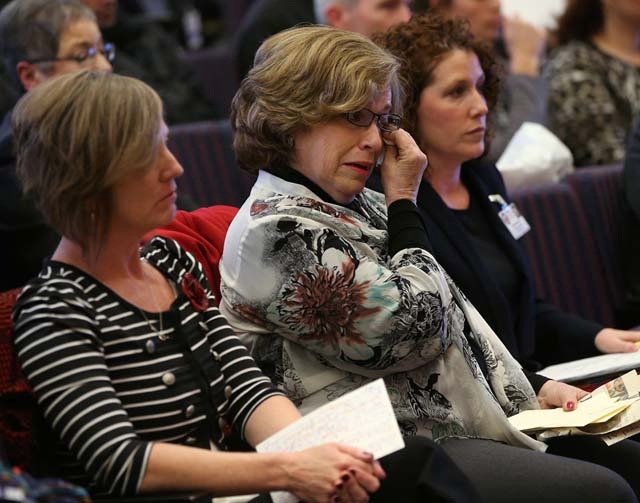Hundreds turn out for first hearing of sex trafficking bill

CARSON CITY — Las Vegas businesswoman Amy Ayoub told Nevada legislators Wednesday that she felt she had an “I am a prostitute” tattoo on her forehead for much of her life and feared that people somehow would find out about the shameful life she lived as a young woman.
“I have worked 40 years to make amends, to restore my sanity,” Ayoub said in talking about the six years she spent being forced into prostitution. “I never got a chance to look my pimp in the eyes and say, ‘I am not afraid of you.’u2009”
Ayoub, a former member of the Nevada Athletic Commission, cried intermittently in testifying before the Assembly and Senate judiciary committees for Attorney General Catherine Cortez Masto’s Assembly Bill 67. She said she hid her secret for 38 years before breaking her silence last year.
The bill would create a new crime of sex trafficking to replace current pandering laws.
Under the bill, a pimp who prostitutes minor girls could be sentenced to life in prison with the possibility of parole. Minimum sentences of 15 years would apply in some instances. Pimps could be required to forfeit assets, including homes, and make restitution to victims.
Victims of sex trafficking essentially would be treated the same as victims of sexual assault, Deputy Attorney General Michon Martin said.
“We want to take back and protect our children and young adults who are being victimized,” Masto said.
The bill would block pimps from waiving preliminary hearings, a tactic police and prosecutors say pimps use to avoid prosecution. Pimps waive their hearing and then threaten girls or their families before the cases go to trial.
In some cases, the pimps move girls out of state to prevent them from being available to testify. One prosecutor said it is nearly impossible to find a victim willing to testify against her pimp because she has left the state by the time of the trial.
testimony aplenty
Assembly Judiciary Chairman Jason Frierson, D-Las Vegas, praised victims who testified, calling them heroes.
They included Camille Naaktgeboren. She told of being repeatedly raped at age 14. She said that one customer kept a piece of her skin as a souvenir and that her pimp “superglued” her vagina so that he could sell her off as a virgin.
The joint panel took no action on the bill after its first hearing in the Legislature, in part because many people proposed amendments.
The hearing before more than 200 people in Carson City and by teleconference in Las Vegas lasted nearly four hours. So many witnesses testified that some were limited to only a minute or so to speak.
Among those was Sgt. Donald Hoier of the Metropolitan Police Department, who said 2,229 juvenile prostitutes have been arrested in Clark County since 1994. He said he was solicited by a 12-year-old.
Hoier told of incidents in which pimps beat and sodomized their prostitutes with baseball bats and others who repeatedly burned their girls with hot irons and choked them with chains.
Still in many cases today, Hoier said, pimps receive probation or no more than five years in prison.
A Reno police officer, Ron Chalmers, said many johns prefer picking up prostitutes on Reno’s Fourth Street rather than driving 10 miles out of town to legal brothels. He said there are several websites where prostitutes offer their services, including one he just read with 200 prostitute advertisements.
Chalmers said Nevada’s legal prostitution industry has created the impression that prostitution is legal in Reno and Las Vegas, which is not true.
“Some (prostitutes) are branded and tattooed with the pimps’ personal brand of ownership,” he said. “Tattoos are not easily removed. It’s like slavery throughout history. It’s modern-day salary.”
Nevada Brothel Association lobbyist George Flint requested language be added to the bill that exempts legal brothels.
SOME OPPONENTS to bill
The bill had some opponents.
Jennifer Reed, a graduate student at the University of Nevada, Las Vegas, said that there are no “hard data” on the depth of the problem in Nevada and that the bill should not be based on “anecdotes.” She said studies show that in other cities, 45 percent of prostitutes are boys.
Reed said the young prostitutes often are not forced to have sex and do not consider themselves victims but are just “kids trading sex for money because that is the way to their survival. They don’t consider it sex trafficking.”
Vanessa Spinazola, representing the American Civil Liberties Union, found problems with some of the bill’s language and noted that “adults can consent” to sex.
Public defenders from Clark and Washoe counties questioned why a new crime of sex trafficking should be created when it would be easier to increase penalties under current pandering laws.
But Andrea Swanson, a school nurse in Clark County, said her daughter, Hannah, was turned into a prostitute by a pimp she met in high school.
“We were totally ignorant there are pimps out there (posing) as everyday young men and recruiting kids out of high school,” she said.
The pimp received a 2½-year prison sentence, but her daughter sent him money, tattooed her wrists with his name and visited him whenever she could.
After he was released at Christmas, the girl went back to live with him.
“The bond wasn’t broken,” said Swanson, who advocated for long prison sentences for pimps.
Contact Capital Bureau Chief Ed Vogel at evogel@reviewjournal.com or 775-687-3901.